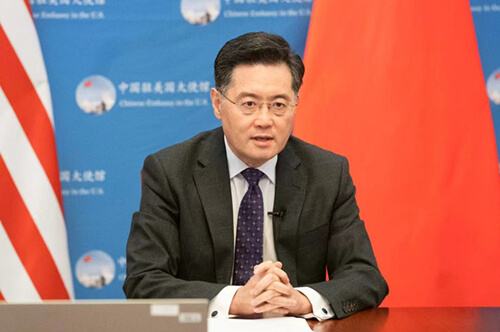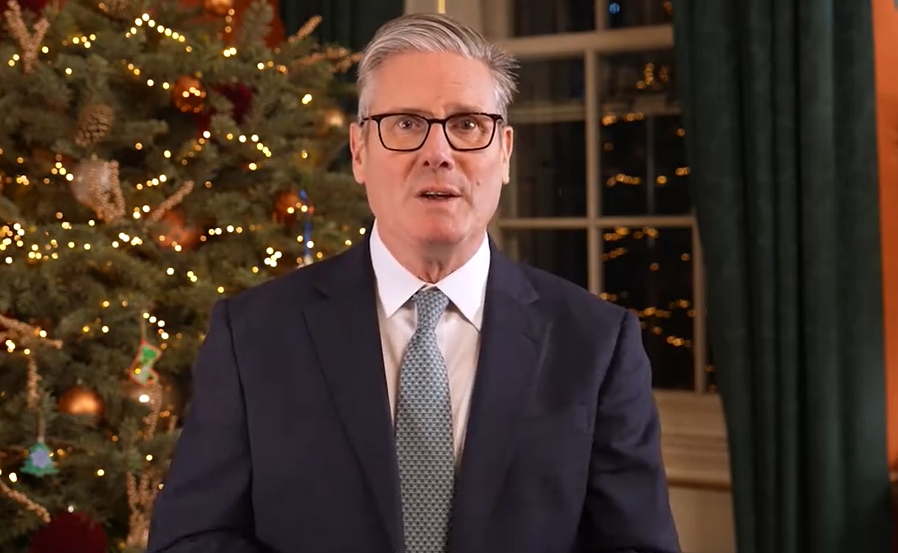CATTI-题库-真题-模拟-课程-直播
 驻美使馆
驻美使馆
 2021-09-27
2021-09-27

 214次
214次

Speech by Ambassador Qin Gang at the Conversation Jointly Held by The Carter Center and The George H.W. Bush Foundation for US-China Relations
秦刚大使在卡特中心和乔治·布什美中关系基金会联合举办的对话会上的演讲
22 September 2021
2021年9月22日
Dear Mr. Neil Bush,
Ms. Barbara Smith,
Mr. David J. Firestein,
Ladies and Gentlemen,
My Friends,
尊敬的尼尔·布什先生,
芭芭拉·史密斯女士,
方大为先生,
女士们,先生们,朋友们:
I want to thank The Carter Center and The George H.W. Bush Foundation for US-China Relations for hosting this event. It’s my great pleasure to meet with you online.
感谢卡特中心和乔治·布什美中关系基金会共同举办这场活动。很高兴以视频方式同朋友们见面。
I wish to thank President Carter for his warm letter and thank Mr. Neil Bush for his kind remarks. We will never forget that 42 years ago, President Carter and Mr. Deng Xiaoping made the historic decision of establishing diplomatic relations between China and the United States. Facing the difficulties in China-US relations after the Cold War, President George H.W. Bush stayed committed to engagement and dialogue with China to increase mutual understanding and trust. Thanks to generations of Chinese and American leaders and people, China-US relations have made remarkable progress.
感谢卡特总统发来热情洋溢的来信和尼尔·布什先生的致辞。我们不会忘记,42年前,卡特总统同邓小平先生共同作出中美建交的历史性决定。老布什总统面对冷战后中美关系的困难,始终坚持通过接触对话增进理解和信任。正是在中美几代领导人和各界人士共同努力下,中美关系才取得了长足的发展。
However, today, some Americans’ misunderstanding and misjudgment about China is building up. A fundamental one is to define America’s relations with China as democracy versus authoritarianism, and to stoke up ideological confrontation, which has led to serious difficulties in China-US relations. Let me share with you my view here.
但是当前,美国一些人对中国的误解、误判却在加深,其中最根本的一条就是把美中关系定义为民主与威权的对决,挑动意识形态对立。这是当前中美关系面临严重困难的症结所在。我想就此和大家谈谈我的看法。
What is democracy?
什么是民主?
As a political system, the word “democracy” originated in ancient Greece. It means “rule by the people”, or “sovereignty of the people”. So a basic criterion of democracy should be whether the people have the right to govern their country, whether their needs are met, and whether they have a sense of fulfillment and happiness. At the center of democracy is people. President Lincoln defines democracy as “of the people, by the people, for the people”. Whatever political system a country chooses, its purpose is to select appropriate persons to govern the country and create a better life for the people.
作为一种政治体制,民主一词发源于古希腊,本意是“人民统治”、“主权在民”。由此可见,对民主最基本的判断标准,就是人民是否有广泛参与国家治理的权利,人民的诉求能否得到回应和满足,人民有没有获得感和幸福感。人民是民主的核心。正如林肯总统说的,“民有、民治、民享”。世界上不管什么政治体制,目的是选出合适的人治理好国家,为人民谋福祉。
In ancient Greece, Plato believed that citizens need to receive various kinds of education at early ages. When they grow up, they would be evaluated to see if they are qualified to be politicians in the future, and those selected would be put to the bottom of society to get prepared for ruling the state. After a long time, the middle-aged candidates, who have survived all the trials and tribulations, no longer engage in empty talk, and they become determined and experienced. When they are ready, they would undertake governing positions, but they can only lead simple lives to prevent corruption.
古希腊的柏拉图主张公民在小的时候要接受各种教育,到他们长大后,通过测试,选出适合从政的青年,把他们放到社会底层经历磨练。经过了漫长的岁月,人到中年时,那些经受住多重考验的人不再夸夸其谈,而是富有坚强的意志和丰富的经验。他们被放到治理国家的岗位上,但他们只能过简朴的生活,防止权力被腐化。
Is China a democracy?
中国是不是民主国家?
– The idea of people first has been deep in the genes of the Chinese since ancient times. Dr. Henry Kissinger said to me, China is a communist and Confucian country. Confucius, an ancient Chinese thinker who lived in the same time as ancient Greece, raised the idea that people are the foundation of a country. Mencius, Confucius’ follower, said, “To a state, the people are the most important thing. The state comes second. The ruler is the least important.” An ancient Chinese ruler believed that the people are to the monarch what water is to boat, and he cautioned that the water can carry the boat; it can also overturn the boat. 100 years ago, the Communist Party of China (CPC) was established as a political party for the poor, and its founding mission is to pursue happiness for the people. With the slogans of anti-dictatorship, anti-autocracy and anti-oppression, it enabled the people to become master of their own country and won the people’s hearts. As the governing party, it has remained faithful to its founding mission: people-centered, and serving the people whole-heartedly.
——中国自古以来有深厚的民本的基因。基辛格博士对我说,中国是共产主义加儒家思想的国家。儒家的代表、与古希腊同时期的中国思想家孔子提出“民本”思想。孔子的再传弟子孟子说,“民为贵,社稷次之,君为轻。”历史上,中国的皇帝将老百姓和君王的关系比作水和舟,告诫统治者“水能载舟,亦能覆舟。”100年前,中国共产党作为穷人的党创立,初心和使命就是为人民谋幸福。中国共产党喊出的口号就是反独裁、反专制、反压迫,人民当家做主,得了民心、夺了政权,但初心不改,始终以人民为中心,全心全意为人民服务。
– What China has today is whole-process democracy. China’s Constitution prescribes that all power belongs to the people. The people have the right to election, and they can be broadly involved in national governance according to law. They exercise state power through the National People’s Congress and local people’s congresses at different levels, equivalent to America’s Congress and state legislatures. Deputies to the people’s congresses at the county and township levels are directly elected. Those above the county level are indirectly elected. People elect deputies, who will politically represent them and elect leaders. Deputies maintain close contact with the people, and all major legislations and decisions are made through scientific and democratic processes and extensive consultations. China also has a unique political consultation system and corresponding institutions, which are important ways for the people to exercise democracy. Any matters that concern people’s keen interests are broadly discussed by people’s congress, the government, political consultative conference, social organizations and industry associations, before major decisions are made, to make sure what the people want are reflected in the final decisions. In China, government officials have many meetings to attend, and they do many field visits. Meetings are for discussing problems and exploring solutions, and field visits are for getting firsthand knowledge of things on the ground. Decisions are made through discussions and debates, which are extensive and intense, just like those on the Capitol Hill. Let me give you an example. The Civil Code is the first law of China with “code” in its name, and is regarded as “an encyclopedia of social life”. When drafting it, there had been ten rounds of collection of public opinions, and over one million opinions were gathered from more than 420,000 people. Another example is the five-year plans on economic and social development. When formulating the current 14th Five-Year Plan, there were also full public consultations. Over 1,000 suggestions were summarized from more than one million online posts, and 366 edits were made to the draft on the basis of them. After the deliberations by the national-level people’s congress and political consultation conference, another 55 adjustments were made before the adoption of the Plan. There are seldom fierce arguments or long-pending bills in people’s congresses in China, because most of the problems and conflicts of interests have been resolved and suggestions accepted in consultations, which also make implementation of the policies easier.
——今天中国的人民民主是全过程的民主。中国宪法规定,一切权力属于人民。人民既有选举权,又有依法广泛参与国家治理的权利。在中国,人民行使国家权力的机关是中国全国人大和地方各级人民代表大会,相当于美国的国会和地方议会。目前,中国县乡两级人大代表实行直接选举,县级以上是间接选举。人民可以选举出他们的代表参政议政,并选出领导人。人大代表密切联系群众,所有重大立法决策都是依照程序,经过民主酝酿,通过科学决策、民主决策产生。中国还有独特的政治协商制度和机构,这是人民民主的重要实现形式。任何重大决策、任何涉及人民切身利益的问题,都要经过人大、政府、政协机构、社会团体、行业组织的广泛充分协商讨论,在各方形成共识的基础上制定出体现人民意志、符合人民利益的政策和措施。中国的会议多,官员下基层多,开会就是协商,研究问题,下基层就是调研,了解实情。在此过程中,各方讨论的广度和辩论的激烈程度不亚于美国国会。例如新中国第一部以法典命名、被称为“社会生活百科全书”的《民法典》编纂过程中,政府先后10次向社会公开征求意见,共收到42万多人提出的100多万条意见。再比如,中国每五年制定一份经济社会发展的规划。今年开始执行第十四个五年规划。在起草过程中,进行了充分协商并公开征求社会意见,并从100多万条网民留言中整理出1000余条建议,作出366处调整,又吸收全国人大和政协代表的意见、建议,对草案作出55处修改才最后通过。在中国的人大机构很少出现面红耳赤的争吵、久拖不决的议案,因为大量的矛盾和诉求在协商过程中已经化解或吸纳了。出台的政策在落实过程中也往往比较顺利。
– In China, talents were chosen based on their abilities and merit since ancient times. Another Chinese philosopher, who was a contemporary of Plato, once said, “Prime ministers must have served as local officials; great generals must have risen from the ranks.” China had an imperial examination system over 1,400 years ago. Whoever passed the exams, regardless of their age and wealth, could be appointed as officials. They usually started from positions at the lowest level of government, and then got promoted or deposed based on their performance. This is the original form of the civil service system in the West today. Nowadays, a Chinese has to pass all kinds of exams in his or her lifetime. At work, there are additional trainings, assessments and selections, as well as oversight from superiors, colleagues, the public and the media. CPC members are also subject to Party disciplines, which are stricter than the law. Any violation will result in serious punishment. Take the Chinese Embassy in the US for example. There is a quarterly assessment of each diplomat from his or her supervisor. Lower-level diplomats can exercise their right of oversight of their supervisors at any time, and once a year, they can grade their supervisors’ performances. In such a system, officials who are incompetent, or not clean, or disapproved by the people have no chance to be promoted. The incumbent members of the Standing Committee of the Political Bureau of the CPC Central Committee, the top leadership of China, have all had long years of work experience from grassroots up to higher levels in different localities. President Xi Jinping became a farmer in a poor village in Northwestern China at the age of 16. He was appointed Party Secretary of Shanghai, the biggest city in China, at 54. The decades in between saw him work on various posts and in different places, and the populations he served varied from several hundred to several hundred thousand, millions and to tens of millions. As he rose through the ranks, he has got to know the people’s kitchen table concerns. He deeply loves the people, cares about the people, and has become capable of managing complexities and getting things done for the people. At the same time, he is loved, trusted and supported by the people. This is why you often find China’s senior officials elected with an overwhelming majority of votes or even unanimously.
——中国自古就注重选贤任能。与柏拉图同一时代的中国另一位伟大的思想家说,“宰相必起于州部,猛将必发于卒伍”。早在1400多年前,中国就发明了科举制。通过考试,任何人不分年龄、贫富,都可以选拔为官,先在基层任职,根据政绩逐步提拔或被淘汰。中国的科举制是今天西方公务员制的鼻祖。如今,中国人一生要经历各种考试,参加工作后还要经历各种实践历练和严格的层层考核、选拔以及上级、同事、社会、舆论的监督。如果是中共党员,还要接受严于法律的党纪约束,触犯了党纪国法,严惩不怠。以驻美使馆为例,上级考核下级,一个季度一次;下级监督上级,随时可以;下级集中给上级打分,一年1次。能力不强、业绩平庸、自身不干净、群众不认可,官员是不会被层层筛选提拔上来的。目前的中国最高领导层中央政治局常委,都曾长期在基层和地方任职。习近平主席16岁到中国西北一个贫穷的农村当一名普通农民,54岁到国际大都市上海任市委书记,其间在不同的地方和岗位工作,服务的人口从几百到几十万、几百万、上千万,从层层历练中体察到了民间疾苦声,深怀了爱民为民之心,具备了驾驭复杂局面、解决实际问题的丰富经验和卓越能力。他也得到了人民的爱戴、信任和拥护。这就是为什么中国高级官员能高票甚至全票当选的原因。
How to evaluate if a system is democratic?
如何衡量一个制度是不是民主?
There are many political systems in the world. Whether a system is democratic depends on whether it can represent the overall interests of the people and whether the people are satisfied. Democracy is not for embellishment; it should deliver. Samuel Huntington writes, “The most important political distinction among countries concerns not their form of government, but their degree of government.” According to a survey done by Harvard Kennedy School for 10 years in a row, the Chinese people’s satisfaction of the CPC has been over 90% for each of the 10 years. Some people wonder why. The answer can be long, but I try to provide a brief explanation. Changchun, a provincial city in Northeastern China, has had a Mayor’s Hotline for 22 years, which citizens can use to report problems that need the government’s attention, and that Hotline works 24/7. Over the years, more than nine million problems have been reported and then resolved through the Hotline, and people’s satisfaction rating has remained above 90%. There are many similar hotlines and high satisfaction ratings across China. If you know about them, is it still hard to understand the results of Harvard surveys?
世界上有不同的制度。一个制度是不是民主,要看其能不能代表人民的整体利益、人民满意不满意。民主不是摆设,更要管用。塞缪尔·亨廷顿说,各国之间最重要的政治分野,不在于治理的形式,而在于治理的程度。根据哈佛大学肯尼迪学院连续10年在中国开展的民调,中国民众对共产党执政的满意度每年都保持在90%以上。有些人不理解为什么?答案很长,我来尝试简短回答这个问题。中国东北一个省会城市长春连续22年开通市长热线电话,一年365天、一天24小时从未间断,及时回应解决群众反映的急难愁盼问题累计900多万件,市民给予的满意率始终保持在90%以上。这样的热线、这样高的满意度在中国各级地方有很多。如果大家了解了市民对市长热线电话的满意度,还难理解哈佛大学的民调结果吗?
My Friends,
朋友们,
When some people are busy fanning up the battle between democracy and authoritarianism, and putting together an alliance of democracies, what is happening on the land of China? Well, absolute poverty has become a thing of the past, and 1.4 billion people are striving towards common prosperity. China has become the world’s second largest economy and biggest trading nation, and contributes over 30% to global economic growth annually. Every day, 16,000 companies are created in China. Every day, over 120 foreign enterprises are rushing to China, one of the biggest consumer markets and the top investment destination in the world. Almost every Chinese has basic medical insurance and old-age pension insurance. Products from remote areas are sold across the country through live streaming. Farmers in deep mountains and young people in cities take high-speed trains to look for jobs elsewhere and pursue their dreams. Green and low-carbon living has become a new fashion. The Chinese are driving 50% of the world’s new-energy vehicles, on the biggest network of expressways in the world. 10% of the Chinese population have visited other countries to open up their eyes. Chinese astronauts have safely returned to Earth after several months’ stay in our space station. The rights and freedoms of the Chinese are fully protected by the Constitution, and they are on their way to ballot stations. Muslims in Xinjiang and other places go to mosques nearby. One billion Chinese netizens get connected with the world for information and engagement at the click of a mouse. China has signed 26 international instruments on human rights. COVID-19 has been basically put under control in China, with 1.1 billion people fully vaccinated. China has provided vaccines to over 100 countries and international organizations, and will supply altogether two billion doses by the end of this year. The Belt and Road Initiative, guided by the principle of extensive consultation, joint contribution and shared benefits, will take tens of millions of people of other countries out of poverty. Over 2,400 Chinese peacekeepers are on duty worldwide. President Xi Jinping yesterday proposed a Global Development Initiative. China is working with other countries to build a community with a shared future for mankind.
两岸猿声啼不住,轻舟已过万重山。当有些人还在制造“民主与威权”之争、满世界拼凑针对中国的“民主国家同盟”时,中华大地在发生着什么呢?14亿中国人彻底摆脱了绝对贫困,正迈步奔向共同富裕;中国已成为世界第二大经济体、第一大贸易国,每年为世界经济增长贡献率超过30%;每天,1.6万户企业在中国诞生,每天,120多家新的外商企业赶往中国这个世界最大消费市场和第一大投资目的地;几乎每个中国人都享有基本医疗保险、基本养老保险;偏远地区的产品通过网络直播带货销往全国各地;大山里的农民、城市中的青年乘坐高铁外出务工,追逐人生梦想;绿色低碳成为新时尚,中国人驾驶着全球50%的新能源汽车奔驰在全世界里程最长的高速公路网上;1/10的中国人走出国门看遍大千世界;中国航天员在空间站驻留数月后成功返回地球;中国人的权利和自由受到宪法的充分保护;中国人民正赶往投票站行使宪法赋予的选举权;新疆等地的穆斯林信众每天就近去清真寺;十亿中国网民通过网络了解天下信息,进行交流,表达观点;中国已签署26项国际人权公约和文书;中国有效控制住新冠疫情,超过11亿中国人完成疫苗接种,中国已向100多个国家和组织提供了疫苗,今年全年将对外提供20亿剂;“一带一路”倡议正本着共商、共建、共享原则推进,将使沿线国几千万人摆脱贫困;2400多名中国维和人员正在全球各地执行任务;习近平主席刚刚提出了全球发展倡议。中国正与各国携手构建人类命运共同体。
I’m not saying China is perfect. There are many difficulties and challenges on our way ahead, such as how to make our development more balanced and adequate, and ensure fairness and justice in a market economy. We are deepening reform, improving socialist democracy, and modernizing national governance. These efforts are to meet the people’s aspiration for a better life and make greater contribution to mankind.
当然,中国并不完美,前进的征程上还面临许多困难和挑战,比如如何在发展市场经济中解决发展不平衡不充分和社会公平公正等问题。但我们在不断深化改革,建设社会主义民主政治,实现国家治理体系和治理能力现代化,更好地满足人民对美好生活的向往,为全人类进步作出更大贡献。
My friends, isn’t it obvious that China is just pursuing peace, development, fairness, justice, democracy and freedom, which are common values of mankind? Isn’t it obvious that both China’s people-center philosophy and President Lincoln’s “of the people, by the people, for the people” are for the sake of the people? Shall we understand China’s socialist whole-process democracy as this: from the people, to the people, with the people, for the people?
朋友们,难道中国不是在追求和平、发展、公平、正义、民主、自由的全人类共同价值吗?难道中国践行的以人民为中心的理念与林肯总统所说的“民有、民治、民享”的思想不都是为了人民吗?我们可不可以这样理解中国的社会主义全过程民主:从人民中来、到人民中去、同人民在一起、一切为了人民。
My friends,
朋友们,
China and the US are different in history, culture and political system. But just as President Carter said, both the American and Chinese people desire peace and prosperity, and leaders in Washington and Beijing share one common goal: to create peaceful and stable conditions for their people to pursue happiness. This is the biggest commonality between China and the US. We never say that our system is the best, because we know only the suited is the best. Whether it is good or not should not be judged by what we say, but what we do. Our two countries should not and cannot change each other. Instead, we should break ideological barriers, discard zero-sum mentality, respect other countries, and accommodate each other without losing our own distinctions, so as to get along with each other in peace.
中美历史、文化、体制不同,但正如卡特总统所说,两国人民都渴望和平与繁荣,两国领导人都希望为本国人民追求幸福创造和平稳定的环境,这就是中美之间的“大同”。我们从不对别国说我们的制度是世界上最好的,因为我们懂得合适的才是最好的。好不好,不看广告,看疗效。中美既不应也无法改变对方,而是应该打破意识形态的藩篱,摈弃零和博弈的逻辑,各美其美、美美与共、相互尊重、和平共处。
President Xi stressed, “China and the United States need to show broad vision and shoulder great responsibilities. The two countries should look ahead and press forward, and bring China-US relations back to the right track of stable development as soon as possible, for the good of the people in both countries and around the world”.
习近平主席强调,“中美应该展现大格局、肩负大担当,坚持向前看、往前走,推动中美关系尽快回到稳定发展的正确轨道,更好造福两国人民和世界人民。”
Ladies and gentlemen,
My friends,
女士们、先生们,朋友们:
Let us demonstrate strategic courage and political resolve to chart a new course in China-US relations.
让我们拿出战略胆识和政治魄力,开辟中美关系的新未来。
Thank you.
谢谢大家!

 点赞(0)
点赞(0)

 收藏
收藏

This Christmas, people will be travelling up and down the country, heading home, visiting relatives and loved ones, to celebrate together the hope and joy of this special season.
英文巴士 2024-12-25 11:41:38
 收藏资讯
收藏资讯

On this occasion, as I offer you all what will be the final Christmas message of my terms as Uachtarán na hÉireann, I recall the values that I stressed in my first Christmas Message in 2011.
英文巴士 2024-12-25 11:38:09
 收藏资讯
收藏资讯

Today, we are meeting here on this solemn occasion to celebrate the 25th anniversary of Macao’s return to the motherland and to hold the inauguration of the sixth-term government of the Macao Special Administrative Region (SAR).
新华网 2024-12-22 09:11:17
 收藏资讯
收藏资讯

Good evening. It is my great pleasure to return to the beautiful Macao after a span of five years and join you in celebrating the 25th anniversary of Macao’s return to the motherland.
新华网 2024-12-22 09:01:51
 收藏资讯
收藏资讯